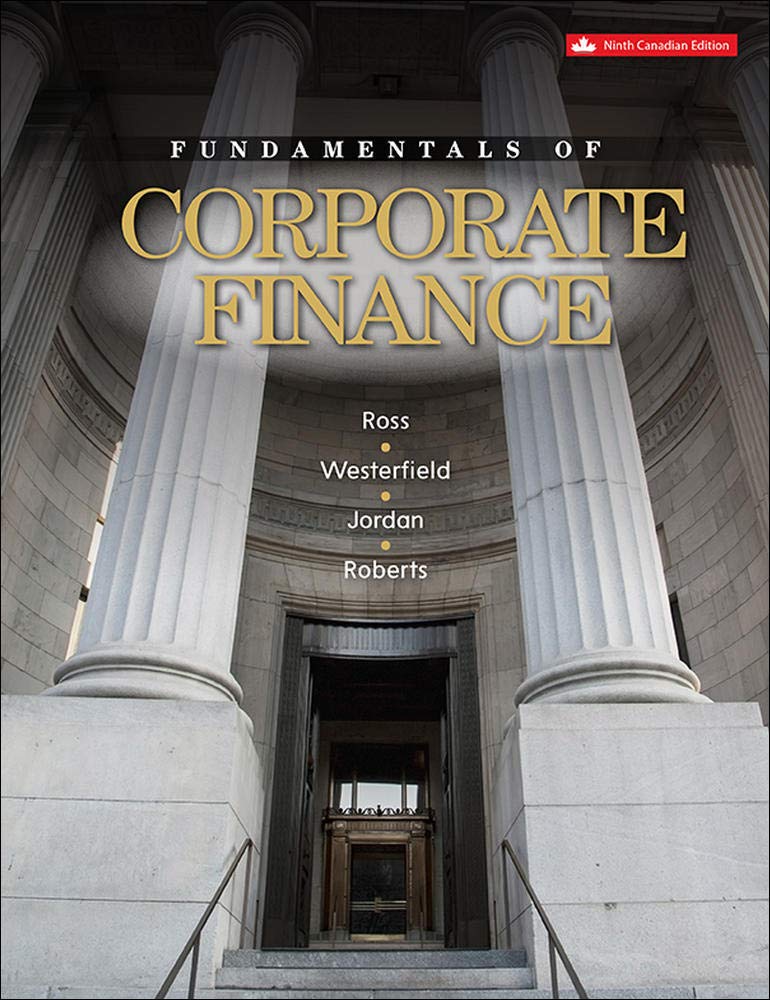Description
Fundamentals of Corporate Finance 9th Canadian Edition By Ross – Test Bank
MULTIPLE CHOICE. Choose the one alternative that best completes the statement or answers the question.
1) Which one of the following actions is the best example of an agency problem? 1) A) Paying management bonuses based on the number of store locations opened during
the year.
B) Basing management bonuses on the attainment of specific financial goals.
C) Accepting a project that enhances both management salaries and the market value
of the firm’s stock.
D) Requiring stockholders approval of all management compensation decisions.
E) Paying management bonuses based on the current market value of the firm’s stock.
Answer: A Explanation: A)
B) C) D) E)
- 2) Which one of the following best describes the primary advantage of being a limited 2) partner rather than a general partner?
A) Entitlement to a larger portion of the partnership’s income. B) Liability for firm debts limited to the capital invested.
C) Greater management responsibility.D) Ability to manage the day-to-day affairs of the business. E) No potential financial loss.
Answer: B Explanation: A)
B) C) D) E)
- 3) Which of the following accounts does not relate to working capital management 3) decisions?
A) Short-term debt.
B) Accounts receivable. C) Long-term debt.D) Inventory.
E) Accounts payable.Answer: C Explanation: A)
B) C) D) E)
1
- 4) The corporate officer generally responsible for tasks related to tax management, cost 4) accounting, financial accounting, and data processing is the:
A) Chairman of the Board. B) Corporate Treasurer.
C) Director.D) Vice President of Operations. E) Corporate Controller.
Answer: E Explanation: A)
B) C) D) E)
- 5) The corporate officer generally responsible for tasks related to cash and credit 5) management, financial planning, and capital expenditures is the:
A) Corporate Controller.
B) Chairman of the Board.
C) Vice President of Operations.D) Corporate Treasurer. E) Director.
Answer: D Explanation: A)
B) C) D) E)
6) The mixture of debt and equity used by the firm to finance its operations is called: 6) A) Agency cost analysis.
B) Financial depreciation.
C) Capital budgeting.
D) Working capital management. E) Capital structure.
Answer: E Explanation: A)
B) C) D) E)
2
- 7) The Board of Directors of Beeline, Inc. has decided to base the salary of its financial 7) manager entirely upon the market share of the firm. Accordingly,
- A) This arrangement may be unnecessary, since the goal of the firm is to maximize earnings for shareholders, and that is most likely accomplished through larger market share.
- B) The manager may not act to maximize the current value of the firm’s stock, resulting in agency costs for the firm’s stockholders.
- C) The firm will incur some agency costs if the manager acts to maximize market share.
- D) The financial manager will always act in the best interest of the shareholders since all agency costs have been eliminated through salary incentives.
- E) The firm may incur some agency costs since the manager will be focused on the market share of the firm rather than acting to maximize earnings.
Answer: B Explanation: A)
B) C) D) E)
- 8) Which of the following does NOT persuade managers to work in the best interest of the 8) stockholders?
A) Purely cash compensation package.
B) Threat of a company takeover.
C) Compensation based on the value of the stock.D) Stock option plans.
E) Threat of a proxy fight.Answer: A Explanation: A)
B) C) D) E)
9) A partnership: 9) A) Has less of an ability to raise capital than a proprietorship.
B) Is taxed the same as a corporation.
C) Terminates at the death of any general partner.
D) Agreement defines whether the business income will be taxed like a partnership or a
corporation.
E) Allows for easy transfer of interest from one general partner to another.
Answer: C Explanation: A)
B) C) D) E)
3
10) The best definition of “agency problem” is: 10) A) Determining the optimal mix of internal and external board of directors.
B) The process of planning and managing a firm’s long-term investments.
C) The purchase or sale of securities whose value derives from the price of another,
underlying, asset.
D) The possibility of conflicts between shareholders and management in a large
corporation.
E) Determining who should be the agent of corporate executives.
Answer: D Explanation: A)
B) C) D) E)



Be the first to review “Fundamentals of Corporate Finance 9th Canadian Edition By Ross – Test Bank”